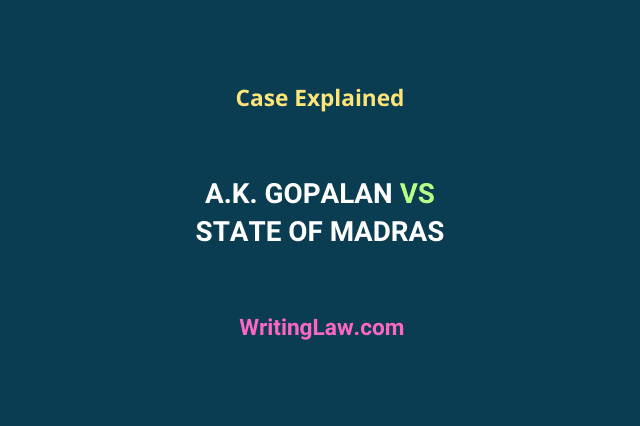
A.K. Gopalan vs the State of Madras (19th May 1950)
Introduction
A.K Gopalan vs the State of Madras is one of the landmark judgements of the Indian Constitution. This case mainly focuses upon the fundamental rights of the Indian Constitution, particularly Articles 19, 21, and 22.
In the case of A.K Gopalan vs the State of Madras, the Supreme Court denied recognising the deficiencies of procedure established by law and due process of law was rejected by the court. However, this was reversed in the case of Maneka Gandhi vs Union of India.
This case law summary talks about A.K. Gopalan vs the State of Madras with its background, facts, and the Supreme Court judgement.
Background of the Case
A.K Gopalan was a communist leader who was mainly active in Madras Presidency (now called Kerala). He was detained in the jail of Madras, and whenever he came out of the prison, a new detention order was issued against him, and he had to go to jail again. After several years of detention, he challenged his preventive detention. A.K Gopalan argued that this prolonged detention had violated his right to life and personal liberty guaranteed under Article 21 of the Indian Constitution.
Facts of the Case A.K. Gopalan vs the State of Madras
A.K. Gopalan was the political opponent of the government. Since December 1947, he was illegally detained several times and even after the court led him free, he was still kept under detention by the government.
In 1950, he was again detained under the Preventive Detention Act, 1950.
Then, A.K Gopalan filed a writ petition under Article 32 of the Indian Constitution challenging his detention under the Preventive Detention Act, 1950.
According to the Preventive Detention Act, 1950, the detainee is not given any reasons for his detention. Therefore, A.K Gopalan argued that this act is unconstitutional as it violates his fundamental rights under Article 19(1)(d), that is, the right to freedom of movement and Article 21, that is, the right to life and personal liberty.
Issues Raised in the Case of A.K. Gopalan vs the State of Madras
The following issues were raised in the case of A.K Gopalan vs the State of Madras:
- Whether the Preventive Detention Act of 1950 violates Article 19 and 21 of the Indian Constitution?
- Whether Articles 19 and 21 of the Indian Constitution are dependent on each other, is there any relation between the Articles?
- Whether the ‘procedure established by law’ under Article 21 of the Indian Constitution is same as due process of law?
Judgement of A.K. Gopalan vs the State of Madras
The judgment of this case was given by 6 judges constitutional bench of the Supreme Court with the ratio of 5:1 majority. Justice Fazl Ali gave the dissenting opinion.
The court rejected the arguments given by A.K. Gopalan and said that personal liberty means freedom of the physical body only and nothing beyond it. In this way, the court restricted the meaning of Article 21 of the Constitution.
Furthermore, the Supreme Court also restricted the meaning of Article 19 of the Indian Constitution and stated that only a free man can enjoy freedom under Article 19 of the Constitution. This means that when a person is under detention, he cannot enjoy the freedom given under Article 19 of the Indian Constitution.
The court further added that Articles 19 and 21 of the Indian Constitution are not related to each other as Article 21 is guaranteed against loss of personal liberty. In contrast, Article 19 provides protection against unreasonable restrictions. Moreover, the court clarified that ‘procedure established by law’ and ‘due process of law,’ i.e., the principles of natural justice are different from each other.
At last, the Supreme Court rejected the petition filed by A.K. Gopalan and held the Preventive Detention Act of 1950 to be constitutional and stated that this Act does not violate Article 19(1)(d) and Article 21 of the Indian Constitution that provides fundamental rights to its citizens.
In A.K. Gopalan vs the State of Madras, the Supreme Court interpreted the meaning of Article 21 and restricted it by diminishing its real value and gave the decision in favour of the government. However, among the 6 judges’ bench, only Justice Fazl Ali was not favouring this judgment. He said that detaining someone without valid reasons, and justification for his detention is illegal and, hence, violative of Article 21.
After several years, in the case of Maneka Gandhi vs Union of India, 1978, the Supreme Court overruled this judgment and held the opinion of Justice Fazl Ali to be correct. The court further stated that Article 21 of the Constitution has a wider scope.
Conclusion
In the A.K. Gopalan case, the court restricted the meaning of Article 21 to the extent that personal liberty only means freedom of personal body and nothing else. The court even restricted the scope of Article 19 and held that the Preventive Detention Act, 1950, is constitutional and does not violate any fundamental right.
Moreover, justice Fazl Ali gave the dissenting view that proved correct in the case of Maneka Gandhi vs Union of India. In this case, the Supreme Court correctly interpreted the meaning of Article 19 and Article 21 and gave it a broader scope.
Read Next:
1. Right to Equality – Article 15 of the Indian Constitution Explained
2. Why 42nd Amendment Is Called the “Mini Constitution of India”
- 13 Characteristics of a Company Under the Companies Act - 5th March 2024
- Lee vs Lee’s Air Farming Ltd – Case Explained - 5th March 2024
- Relevant Facts Under the Indian Evidence Act - 14th January 2024







